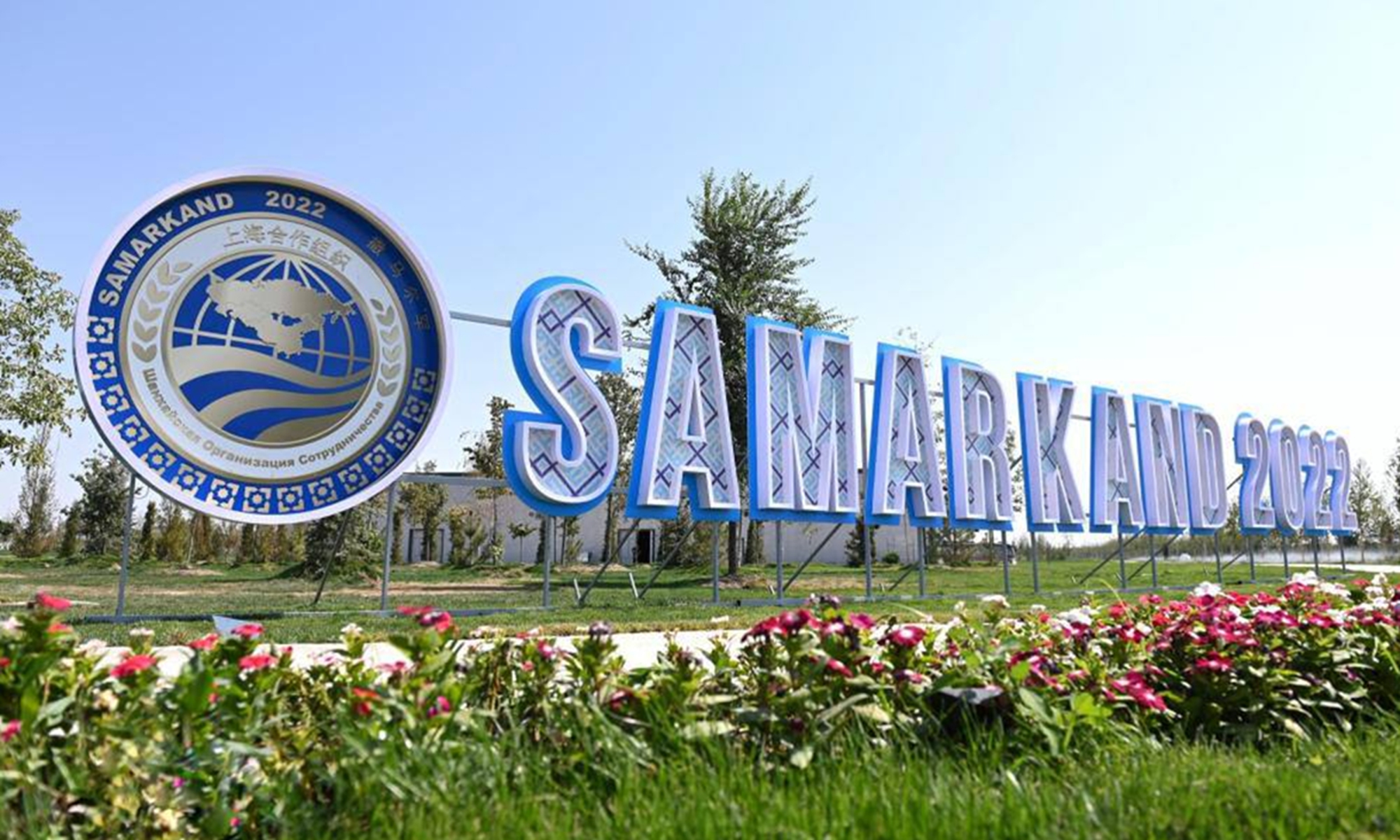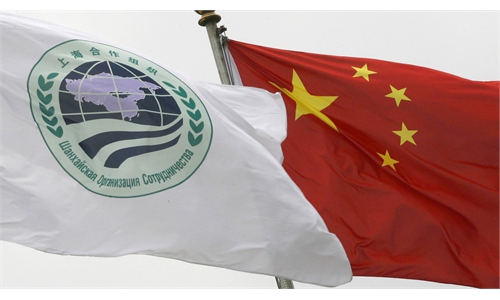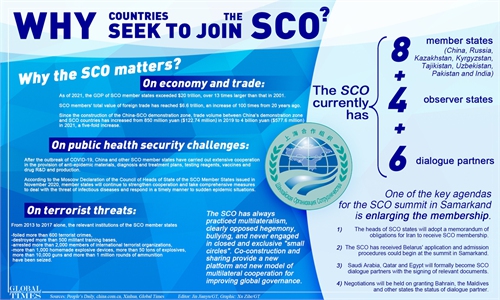SCO economic cooperation in spotlight amid global challenges
‘Vast potential’ for cooperation in sectors like food, energy

A signboard of the SCO Samarkand Summit is seen in Samarkand, Uzbekistan. Photo: Courtesy of Embassy of Uzbekistan in China
As the 22nd meeting of the Council of Heads of State of the Shanghai Cooperation Organisation (SCO) is set to kick off in Uzbekistan on Thursday, economic cooperation among member states and other partners in a wide range of areas from energy to food to infrastructure will also become a focus at the meeting, Chinese analysts said on Wednesday.
Though the SCO has been mainly focusing on security issues, there is also vast potential as well as growing urgency for economic and trade cooperation among the member states and other partners, as the global economy faces multiple challenges ranging from food and energy shortages to growing economic sanctions led by the US, analysts noted.
SCO members have in recent months moved to further boost economic and trade cooperation. As one of the latest results of SCO economic cooperation, the China Development Bank (CDB) said on Wednesday that it had completed 63 cooperation projects under the framework of the SCO Interbank Consortium, extending loans totaling $14.6 billion to member banks and partner banks by August, covering production capacity cooperation, infrastructure, green and low-carbon development, and agriculture.
The CDB will strengthen cooperation in the fields of advanced manufacturing, modern logistics, medicine and health, advanced technology and new technologies.
SCO members have also seen rapid development in recent years. In 2021, the combined GDP of SCO members reached about $23.3 trillion, accounting for nearly 25 percent of global GDP, which is over 13 times larger than that of the time of its establishment in 2001.
In 2021, China's trade with other SCO members reached $343.1 billion, up 40 percent year-on-year. In general, SCO members' total foreign trade totaled $6.6 trillion as of 2021, an increase of 100 times from 20 years earlier.
Analysts said that the SCO has acquired broader significance for the sound development of international relations and cooperation, especially at a time when globalization has been under attack recently from US-led unilateralism and hegemonism and when mutually beneficial trade rules are being eroded for political purposes.
Western countries led by the US are now threatening global industrial security, including energy and food, in the form of economic sanctions; therefore, economic security has also become a focus of the SCO, said analysts.
They said that the use of the yuan and other currencies of countries under the SCO framework in trade settlement will greatly support regional energy and food security, since Russia, Uzbekistan and Kazakhstan - all SCO member states - are major world energy suppliers. Russia and other SCO countries are also major food suppliers.
"SCO member states basically border each other, and many of them are landlocked countries, which makes their land trade a 'closed-loop trade,' and they thus can avoid the US and EU in terms of transportation and settlements, involving trade of agricultural products, energy and industrial raw materials," Hu Qimu, chief research fellow at the Sinosteel Economic Research Institute, told the Global Times on Wednesday.
But the precondition for cooperation is infrastructure connectivity, including pipelines, highways and railways, which is also in line with the development goals of the China-proposed Belt and Road Initiative (BRI), said analysts.
For example, the tunnel on the Angren-Pap railway line, the longest tunnel in Central Asia, has been successfully completed. Meanwhile, more capacity potential of the China-Kyrgyzstan-Uzbekistan highway has been released, and preliminary work on the China-Kyrgyzstan-Uzbekistan railway project has made positive progress.
Energy cooperation among SCO members has basically covered the entire industrial chain, Xu Qinhua, director of the Centre for International Energy and Environment Strategy Studies at Renmin University of China, told the Global Times on Wednesday.
"From upstream energy production and transportation to downstream oil refining, there is profound integration and cooperation. Basically, the energy trade among SCO member states has formed an internal cycle, with obvious complementary advantages among them, such as capital, markets, technology and resources. In the [SCO] region, the role of the US dollar is declining," said Xu.
Hu said that using the yuan as a settlement currency will further facilitate trade, which is a natural choice, pointing out that the currency that most likely can hedge against the US dollar's global "harvest" is the yuan.
The yuan ranked fifth as a reserve currency in the first quarter of 2022, accounting for 2.88 percent in the Currency Composition of Official Foreign Exchange Reserves, according to the latest data from the IMF.


